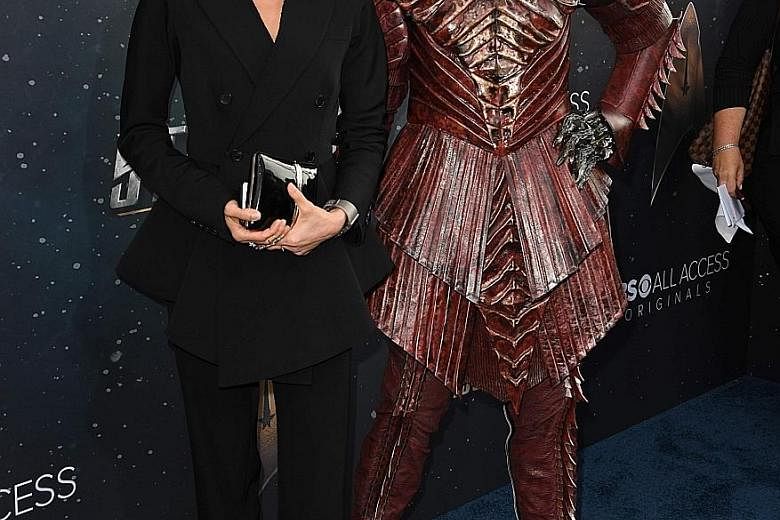NEW YORK • On this planet, 12 years have elapsed since the last Star Trek television series ended.
A new series, Star Trek: Discovery, whose first episode was to be shown yesterday on CBS, is set a decade before the adventures of Captain Kirk and the original Star Trek. It embraces the narrative traditions of the serialised age of television, with further episodes to be released on the network's streaming service, CBS All Access.
Its central storyline plays out over a 15-episode season and its characters can be morally ambiguous and untrustworthy.
Discovery is also a series that has weathered several challenging years of development and production, multiple delays and the sudden departure of its co-creator Bryan Fuller.
All the while, it has striven to stay true to the guiding philosophy of Star Trek at a volatile moment. "The world got pretty horrible in the last couple of years," Alex Kurtzman, the other co-creator, said. "More than ever, people need Star Trek."
Kurtzman is a writer and producer of the 2009 Star Trek film reboot and its 2013 sequel Star Trek Into Darkness.
About 21/2 years ago, he began to work out the premise of a new show with Fuller, who developed TV's Hannibal and wrote for the Star Trek series Deep Space Nine and Voyager.
Kurtzman and Fuller set their story in an era when the United Federation of Planets has achieved a seeming utopia but remains fearful of the mysterious and belligerent Klingon race. The creators made their protagonist a Starfleet first officer - a more vulnerable, less certain character - rather than a captain, as past Treks have done.
This character is highly regarded on her starship and throughout the Federation, but, in the earliest episodes of Discovery, she makes some fateful choices that fundamentally change how she is perceived and that land her on a new vessel.
CBS announced Star Trek: Discovery in November 2015 and the debut of the series was planned for January this year. In September last year, CBS pushed the Discovery premiere date to May this year to give the show some breathing room.
The first cast members were hired, including Michelle Yeoh as Captain Georgiou, Anthony Rapp as the dyspeptic science officer Lt Stamets and Doug Jones as the Kelpien alien crew member Lt Saru.
After a far-reaching audition process, Fuller wanted Sonequa Martin-Green, a star of AMC's The Walking Dead, to play the central character, First Officer Michael Burnham.
But Martin-Green was not available for the start of production because she still had a few remaining weeks on The Walking Dead.
Behind the scenes, Discovery was falling behind schedule. Sets, costumes and special effects needed to be designed; budgets were growing to more than US$6 million (S$8.1 million) an episode; and Fuller disagreed with the TV veteran David Semel (Madam Secretary), who had been hired to direct its pilot episode.
Last October, CBS announced that Fuller would step away from Star Trek: Discovery. The premiere of Discovery was pushed back to this month and this latest postponement allowed Martin-Green to come on board after all.
Nonetheless, no one is quite sure how many viewers will follow Discovery from their TV sets to a paid online service. Kurtzman said: "We had to make it worth people's money."
That called for better special effects and better production design.
"People have to pay for Game Of Thrones too," he said. "Nobody's complaining about that. That becomes our standard now."
NYTIMES

